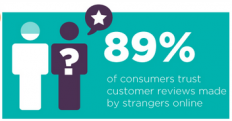The Power of the Online Review
If you’re active on the Internet (because you don’t happen to live under a rock), you’re probably familiar with most popular customer review websites. Some top dogs are Yelp, Angie’s List, TripAdvisor, Zagat, and Urbanspoon. Customer review sites allow people to log in, find companies and services, and review them by giving a star rating and/or a written review. It’s a simple process, and it has serious implications for your business.
Online Reviews By The Numbers
Just at the off chance you were planning to overlook these popular review-churning machines, here are three compelling bits of data to change your mind:
- People really like writing reviews. Traffic on the top 10 review sites grew 158% from 2009 to 2010, on average. In 2012, Yelp.com saw 78 million visitors every month (mashable.com).
- People trust reviews. About 72% of consumers said they trust online reviews as much as personal recommendations, according to a 2012 Local Consumer Review Survey.
- The more people trust reviews, the more they look to these reviews when deciding which local business to use. In 2012, 52% of consumers said a positive customer review makes them more likely to use that business.
Reviews or Testimonials? How About Both
It’s great to have testimonials on your website to reinforce your reputation; we totally encourage it. But I think we can all agree that those shining smidgeons of customer praise are just a tad biased. Everyone knows that you hand selected those testimonials for your website. What were you going to do, advertise bad reviews?
The inherent bias of website testimonials is one of the main reasons why customer reviews on sites like Yelp are so important. These reviews help your business because they are independent from your company and consumers really trust them. The good ones are like free advertising for your business.

Plus, search engines understand the value of what people write about businesses, and they understand that searchers are increasingly looking for those reviews. Google shows Google Reviews stars and ratings in its local map results. Yahoo! Local has its own directory for reviews, which it also feeds to Bing. All three major search engines give prominence to Yelp listings and reviews from other sites across the web in their local results. You don’t have to look hard to find an opinion, these days.
How Can I Get More (and Better) Reviews?
Follow these rules of thumb:
- Ask your customers to write reviews! It’s not in bad taste to share with especially close or satisfied customers that their review would be greatly appreciated by you and your company. Use your judgment about when/where/how to ask, but generally speaking, happy customers will pay it forward if you ask nicely.
- Good customer service leads to good reviews. Even if customers end up less than thrilled with your product or service (this will inevitably happen from time to time), an excellent customer service experience can make up the difference – and it can earn you more stars in the reviews.
- Link to your Yelp or Google+ page on your website to make it even easier for your customers to read and add reviews.
- Claim your listings! Yelp and other review sites – not to mention the search engine local directories – allow you to “claim” your business listing. Optimize your company’s profile with pictures, hours of operation, categories, contact details, and some “about us” info. Use the spotlight to draw positive attention to your company.
- Seek out niche review sites and make sure you’re in them. Real estate portals like Zillow and Trulia, for example, allow visitors to rate agents. If you don’t already have a presence, claim your listing.
- Don’t spam the review sites. Paying for reviews and flooding the review sites with many new reviews at once can backfire. The companies that host reviews will catch this and choose not to show them in searches (a process called “filtering”).
Customer review aggregators are powerful websites that undoubtedly affect your online reputation. The big takeaways here are to claim and optimize your listings, ask your customers for reviews, and use reviews as a motivator for supreme customer service. While customer reviews are not always positive, use the critical ones for self-reflection and attempt to make things right with those customers. Every bad review is a chance to change someone’s mind about your company.

